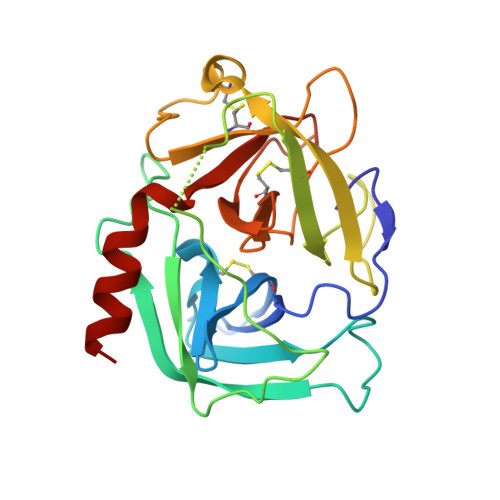Potency variation of small-molecule chymase inhibitors across species.
Kervinen, J., Crysler, C., Bayoumy, S., Abad, M.C., Spurlino, J., Deckman, I., Greco, M.N., Maryanoff, B.E., de Garavilla, L.(2010) Biochem Pharmacol 80: 1033-1041
- PubMed: 20599788
- DOI: https://doi.org/10.1016/j.bcp.2010.06.014
- Primary Citation of Related Structures:
3N7O - PubMed Abstract:
Chymases (EC 3.4.21.39) are mast cell serine proteinases that are variably expressed in different species and, in most cases, display either chymotryptic or elastolytic substrate specificity. Given that chymase inhibitors have emerged as potential therapeutic agents for treating various inflammatory, allergic, and cardiovascular disorders, it is important to understand interspecies differences of the enzymes as well as the behavior of inhibitors with them. We have expressed chymases from humans, macaques, dogs, sheep (MCP2 and MCP3), guinea pigs, and hamsters (HAM1 and HAM2) in baculovirus-infected insect cells. The enzymes were purified and characterized with kinetic constants by using chromogenic substrates. We evaluated in vitro the potency of five nonpeptide inhibitors, originally targeted against human chymase. The inhibitors exhibited remarkable cross-species variation of sensitivity, with the greatest potency observed against human and macaque chymases, with K(i) values ranging from approximately 0.4 to 72nM. Compounds were 10-300-fold less potent, and in some instances ineffective, against chymases from the other species. The X-ray structure of one of the potent phosphinate inhibitors, JNJ-18054478, complexed with human chymase was solved at 1.8A resolution to further understand the binding mode. Subtle variations in the residues in the active site that are already known to influence chymase substrate specificity can also strongly affect the compound potency. The results are discussed in the context of selecting a suitable animal model to study compounds ultimately targeted for human chymase.
Organizational Affiliation:
Johnson & Johnson Pharmaceutical Research and Development, Welsh and McKean Roads, Spring House, PA 19477, United States. jukkakervinen@comcast.net
















